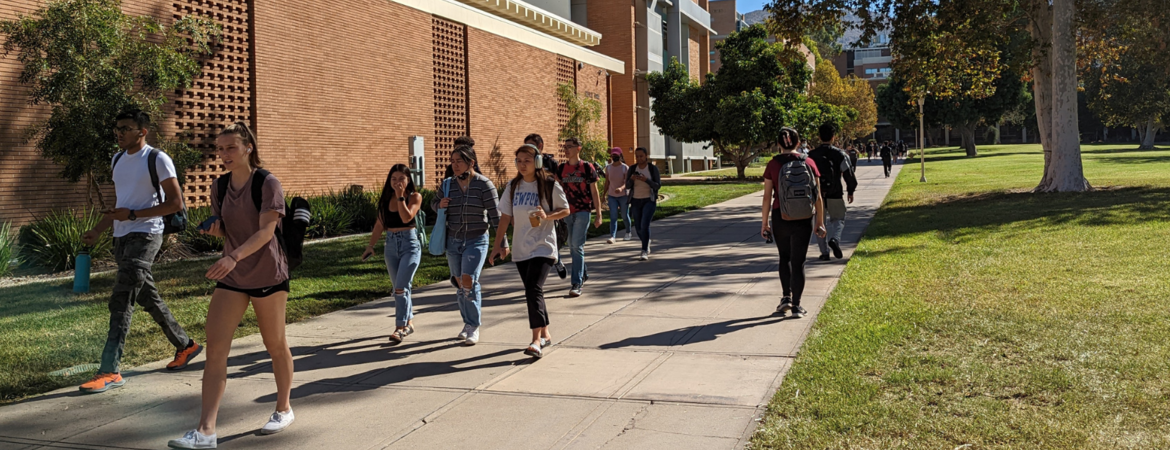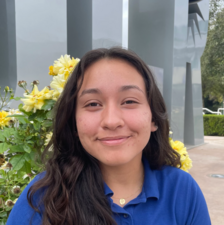
“To this day, I don’t think I would’ve been able to earn my degree if it weren’t for the amazing people I found at UCR, who were cheering me on and inviting me to their study groups,” says Ashley Trinidad, who graduated from the UC Riverside College of Natural & Agricultural Sciences (CNAS) last June with a B.S. in Neuroscience.
Although she admits that she felt comfortable with the “general vibe” at UCR, she says she quickly learned that the campus was filled with peers with an earnest desire to help each other.
“I was afraid that as a STEM student, I would be faced with students who would want to compete with each other, or who wouldn’t be willing to work together to get through difficult classes,” she says. “From the beginning of my UCR journey to the end, I met students who were eager to take the time to help teach difficult concepts to each other, to hang out and decompress, and just be there for each other when we didn’t get the test scores we were hoping to achieve. It’s a kind of togetherness that I didn’t find at any other school.”
In addition to fellow students who were always on call to lend support, Ashley cites Drs. William Porter and Ann Cheney, her research principal investigators (PIs) for more than two years, as key mentors. “Through the trust they built up in me, I developed the confidence to both participate and lead in various aspects of the lab research they were doing,” she says. “They have had a great impact on my career as a public health researcher. I truly believe that if it weren’t for them, I wouldn’t have had the success I have today.”
Ashley is currently serving as coordinator of the Coachella Valley Indoor Air Filtration and COVID-19 Project, run by UCR’s Environmental Science and School of Medicine Department. The project monitors the indoor air quality among a group of 50 residents of Coachella Valley.
“We also work to install a low-cost air filtration system in the homes of participants in the project as well as investigate the impacts of these filters on air quality and respiratory health,” she says.
Ashley would like to continue leading similar projects that advocate for improving the health of underserved communities and people of color. Ashley attended Arroyo High School in El Monte, CA, an area with many first-generation students coming from low-income families. “Due to the level of poverty afflicting most of these families, many students didn’t go to college, much less graduate,” she says. “Instead, they often went straight into the workforce to help pay bills and raise siblings.”
According to Ashley, enrolling in a trade school was the outcome expected by her high school faculty. It was also the reason she was nervous about going to college. “I just didn’t feel like my math or science skills were up to par with the other students I knew were going to be at UCR,” she says. “Regardless of all the AP classes I took to prepare, the thought of college was a very daunting topic for me as a first-generation student because there was rarely anyone around my age that I could talk to about their experience.”
However, once enrolled at UCR, Ashley took advantage of all the tutoring, office hours, and mentoring that she could. “Something that I found comforting was that the vast majority of students at UCR are first-generation and people of color, so we were all kind of on the same page. Being able to talk to friends and peers who came from similar backgrounds was very encouraging, and helped me to feel like I wasn’t alone in this experience.”
Ashley’s best advice to current and prospective UCR students is to have an open mind when it comes to career choices. “Many students come to UCR with only one career in mind, when the university actually gives students the opportunity to explore who they are and discover new passions,” she says. “UCR has something for everyone. I remember coming into UCR as a pre-med student. While I did take advantage of UCR’s connections to volunteer programs at free clinics, hospitals, and the Health Professions Advising Center (HPAC), I also took advantage of UCR’s Cal-Teach program, where I had the opportunity to travel to middle and high schools in the Inland Empire and teach them STEM-related subjects.”
UCR’s on-campus research opportunities were where Ashley found her passion for working in public health via promoting and advocating ways in which air quality can be improved within the Coachella Valley. “I feel like if I wasn’t as open minded to different careers, I wouldn’t have found my real passion,” she says.
Perhaps the biggest challenge Ashley faced at UCR was being overwhelmed by the embarrassment of riches of the numerous campus clubs and organizations. “I felt like if I wasn’t a part of everything, then I would be missing out on the ‘college experience’ or an opportunity to add more to my resume,” she remembers. At one point, Ashley admits she was involved in so many groups that her class work began to suffer. That was when she decided to take a step back.
“This also allowed me to further expand my skills in areas that I genuinely found interesting, and by doing so, I found myself having an easier time expanding my resume,” she says.
As Ashley embarks on her public health career path, she says she will miss the people she was able to bond and work with who made her years at UCR so pivotal.
“The ending is kind of sad because everyone either goes back home or moves away from Riverside for work,” she says. “So, it becomes much harder to see the people that you saw every day for years.”
But, as Ashley is quick to note, there’s a silver lining. “I hope to see them all for years after graduation!”
